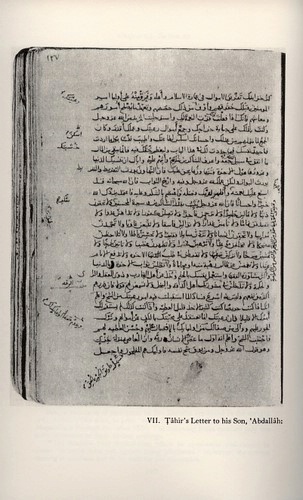Human Civilization
Chapter III
[50] Human Civilization Requires Political Leadership for its Organization
"We have mentioned before in more than one place that human social organization is something necessary. It is the thing that is meant by "the civilization" which we have been discussing. (People) in any social organization must have someone who exercises a restraining influence and rules them and to whom recourse may be had. His rule over them is sometimes based upon a divinely revealed religious law. They are obliged to submit to it in view of their belief in reward and punishment in the other world, (things that were indicated) by the person who brought them (their religious law). Sometimes, (his rule is based) upon rational politics. People are obliged to submit to it in view of the reward they expect from the ruler after he has become acquainted with what is good for them.
The first (type of rule) is useful for this world and for the other world, because the lawgiver knows the ultimate interest of the people and is concerned with the salvation of man in the other world. The second (type of rule) is useful only for this world.
We do not mean here that which is known as "political utopianism" (siyâsah madanîyah). By that, the philosophers mean the disposition of soul and character which each member of a soial organization must have, if, eventually, people are completely to dispense with rulers. They call the social organization that fulfills these requirements the "ideal city". The norms observed in this connection are called "political utopias" (siyâsah madanîyah). They do not mean the kind of politics (siyâsah) that the members of a social organization are led to adopt through laws for the common interest. That is something different. The "ideal city" (of the philosophers) is something rare and remote. They discuss it as a hypothesis ... " (op. cit., ibid., Vol.II, pp. 137-138)
Tâhir's Letter to his Son, Abdallâh
Abstract: The Famous Letter of Tahîr b. al-Husayn
"In the name of God, the Merciful, the Compassionate.
And now: It is your duty to fear the one and only God, to be afraid of Him, to watch Him, to keep away from His wrath, and to guard your subjects night and day. With the help of the good health with which God has clothed you, apply yourself to thinking of your resurrection and the place where you will be going, as well as to the things that will be your concern and for which you will be held responsible. Also apply yourself to working in that sense in such a way than on the Day of Resurrection, God will protect you and save you from His retribution and painful punishment.
God has been benevolent to you. He has made it obligatory for you to show kindness to those of His servants whom He has made your subjects. He has made it your duty to be just to them, to see to it that His rights and punishments are observed in connection with them, to defend them and protect their families and women, to prevent bloodshed, to make their roads safe, and to enable them to live in peace. God will punish you in connection with the duties He has placed upon you (if you do not take care of them properly). He will make them your concern and hold you responsible for them and reward you for (the good deeds) you have done or (the evil deeds you have) not done. Keep your mind, brain, and eye free for that. Let nothing draw your attention from it. It is your principal and crucial task. It is the first thing through which God will give you successful guidance. Let the first thing to which you apply yourself and on which you work, be unfailing fulfillment of the duty of the five daily prayers that God has imposed upon you ..." (op.cit., ibid., Vol.2, pp. 140-141)



